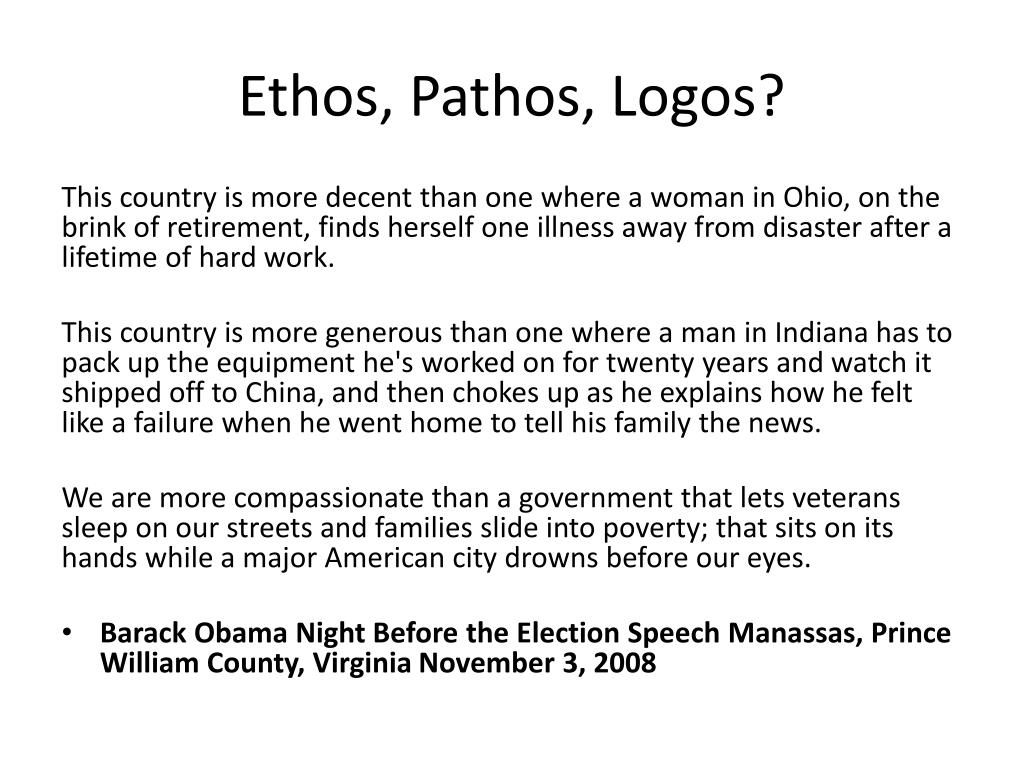
If both the advertisement made 40 years ago and the exact same advertisement made today contain the same speaker with the same credentials (ethos), and the same arguments with the same logic (logos), and they both appeal to the same emotions and the same values (pathos), but the reception is completely different, then what has changed is the context in which the presentation was made (kairos). Kairos is an appeal to the timeliness or context in which a presentation is publicized, which includes contextual factors external to the presentation itself but still capable of affecting the audience's reception to its arguments or messaging, such as the time in which a presentation is taking place, the place in which an argument or message is being made, the background information and demographics of an audience such as age, culture, faith, creed, etc., the appropriateness of the speaker's tone given the nature of the occasion, and the relationship between the speaker, the audience and the topic.Īn example would be an outdated advertisement that would have been effective 40 years ago but hasn't aged well by today's standards. Kairos (plural: kairoi) is an arguable fourth mode of persuasion which means the "right time", "season" or "opportunity". I come to speak to you in defense of a cause as holy as the cause of liberty-the cause of humanity. The humblest citizen in all the land when clad in the armor of a righteous cause is stronger than all the whole hosts of error that they can bring. I would be presumptuous, indeed, to present myself against the distinguished gentlemen to whom you have listened if this were but a measuring of ability but this is not a contest among persons. In some cases, downplaying the ethos can be done while emphasizing pathos, for example as William Jennings Bryan did in his Cross of Gold speech: Pathos may also include appeals to audience imagination and hopes, done when the speaker paints a scenario of positive future results of following the course of action proposed. In addition, the speaker may use pathos and fear to sway the audience. Pathos is most effective when the author or speaker demonstrates agreement with an underlying value of the reader or listener. Pathos can be particularly powerful if used well, but most speeches do not solely rely on pathos. It can be in the form of metaphor, simile, a passionate delivery, or even a simple claim that a matter is unjust. : 42 The terms sympathy, pathetic, and empathy are derived from it. Summary: Logos Definition Literatureĭefine logos in literature: the definition of logos in literature is a rhetorical device that appeals to logic and reason.Pathos (plural: pathea) is an appeal to the audience's emotions. Here, Obama is appealing to logos to convince his audience that, as President, he has positively made change to affect America’s growth and development. With these words, Obama is utilizing facts, numbers, and statistics to logically prove to his audience that American’s economy is on the rise. And we’ve done all this while cutting our deficits by almost three-quarters. That’s just part of a manufacturing surge that’s created nearly 900,000 new jobs in the past six years. Let me start with the economy, and a basic fact: The United States of America, right now, has the strongest, most durable economy in the world. We’re in the middle of the longest streak of private sector job creation in history. More than 14 million new jobs, the strongest two years of job growth since the ‘90s, an unemployment rate cut in half. Our auto industry just had its best year ever.

The following is an excerpt that specifically appeals to logos. Logos is a broader idea than formal logicthe highly symbolic and mathematical logic that you might study in a philosophy course. What is logos in literature? In his 2016 State of the Union Address, President Barack Obama appealed to ethos, pathos, and logos. It is the writer’s responsibility to evaluate his audience to determine the best appeals for his argument. Some arguments might call for more emotional appeals.

Not all arguments will have the same “amount” of logical appeals. Logos is a tool that helps writers do this. The purpose of writing is to convince someone of something. This is why a writer should include appeals to logos in his argument. It is very difficult to believe or support an argument if it does not make logical sense. Most arguments will contain at least some appeals to logos. This is one of the primary methods a writer uses to convince his audience of his argument.

Why use logos? Logos is a vital aspect in an argument.


 0 kommentar(er)
0 kommentar(er)
